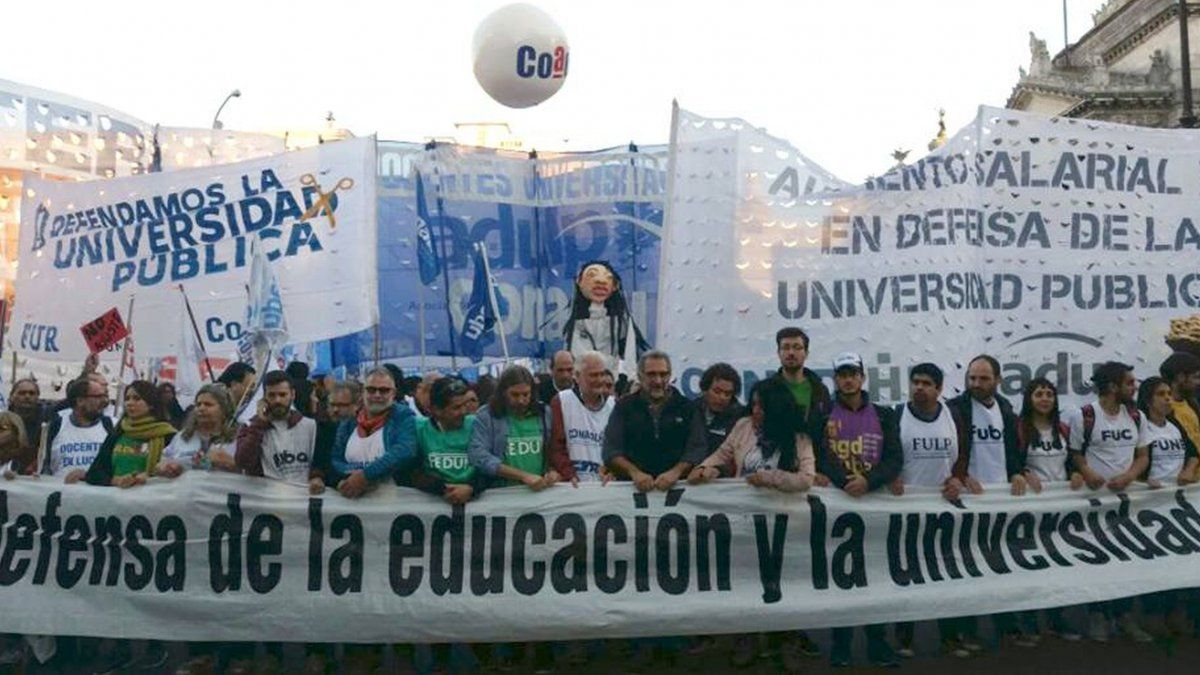Under the motto “The University is not the problem, it is part of the solution“, thousands of people will demonstrate in rejection of budget cuts, the privatization of services and the elimination of scholarship programs. The protest will be a repeat of the massive mobilization that took place on last April 23rd.
What time is it and where does the Federal University March begin?
The central mobilization will begin at 17 in the National Congress Square and will have replicas in the main cities of the country.
Embed – https://publish.twitter.com/oembed?url=https://x.com/JMilei/status/1834647943996932169?ref_src=twsrc%5Etfw%7Ctwcamp%5Etweetembed%7Ctwterm%5E1834647943996932169%7Ctwgr%5E550cf 45e3d79842c79cf2a91f841eb0665fc1c88%7Ctwcon% 5Es1_&ref_url=https%3A%2F%2Fwww.lanacion.com.ar%2Fpolitica%2Fel-gobierno-said-that-it-is-analyzing-a-possible-veto-to-the-university-financing-law- que-nid13092024%2F&partner=&hide_thread=false
The mobilization will begin at 5 p.m. in CABA and will have replicas in the main cities of the country. In the north of the country, the authorities of the National University of Tucumán (UNT) called for the march, the Superior Council of the National University of the Northeast (UNNE) adhered to a document critical of the Council of Rectors (CIN)while the National University of Salta (UNSA) will coordinate next week’s mobilization with the CGT and other unions.
For their part, the rectors of public universities, grouped in the National Interuniversity Council (CIN) They issued a document in which they highlighted the critical situation that the country’s public universities are going through.
In this way, they called to mobilize the entire educational community: “The situation today is more critical than at the beginning of the year, with a dramatic chapter in salary matters. It is inadmissible and deeply unfair that those who have the responsibility of training future generations of professionals and, with their daily work, they allow universities to function, are today the worst payments and the most harmed by the increases granted. More than 70 percent of higher education workers they receive salaries below the poverty line and thousands have not received any increase since the beginning of the year” they detailed.
Federal University March: what are the main demands:
The measure was announced by the Confederation of Education Workers of the Argentine Republic (CTERA) on September 25. Among the main demands of the union are a greater budget for the educationthe restitution of the FONID and the rejection of the veto of the university financing bill.
Embed – https://publish.twitter.com/oembed?url=https://x.com/cteracta/status/1838713831159185792&partner=&hide_thread=false
The legislative project approved in Congress is the central point of the claim. The standard establishes a recomposition of the wages of teaching and non-teaching staff from December 1, 2023 until the sanction of the project. According to a report from the Congressional Budget Office, its implementation would mean “a budgetary impact of $738,595 million, equivalent to 0.14% of GDP”.
In addition, the legislation also established that, every two months, the Government must adjust the budgets of the Universities according to inflation.
In the run-up to the mobilization, the Government renewed criticism and pointed out against the passing of the law by Congress: “andThe Government is not against the claimwe are against Congress passing laws without a budget allocation, laws that cannot be financed,” explained the presidential spokesperson, Manuel Adorni, at the press conference this Tuesday.
The national official also explained that the Ministry of Human Capital “made every effort to improve the salaries of teachers and non-teachers.” Regarding this, Adorni assured that “a salary increase of 6.8% was offered” for the month of October, which was rejected by the teaching unions.
Federal University March: which streets will be closed
The intention of the Buenos Aires Government is that the mobilization do not cause street closures. For this, they will have the work of the staff of the City Police for prevention.
Despite this, if we take into account that in its first edition the Federal University March had a great adhesionit is expected that the Congress area and surrounding areas will be affected by columns of protesters. Given this, the authorities recommend avoid traveling through that area during the mobilization day. For its part, the Ministry of Security, led by Patricia Bullrich, did not confirm whether the “anti-picket protocol”.
Furthermore, the Ministry of Public Space and Urban Hygiene of the City ordered a preventive operation to remove garbage containers that are located around the Legislative Palace. In total, approximately 120 containers. Once the march is over, they will be put back in their place, simultaneously with the cleaning operation that will begin when the protesters leave the Congress area.
Source: Ambito
I am an author and journalist who has worked in the entertainment industry for over a decade. I currently work as a news editor at a major news website, and my focus is on covering the latest trends in entertainment. I also write occasional pieces for other outlets, and have authored two books about the entertainment industry.




